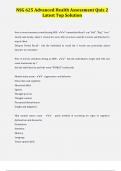NSG 625 Advanced Health Assessment Quiz 2
Latest Top Solution
How is recent memory tested during MSE - ✔✔✔ - Immediate Recall - say "ball", "flag", "tree"
clearly and slowly, about 1 second for each. After you have said all 3 words, ask him/her to
repeat them
Delayed Verbal Recall - Ask the individual to recall the 3 words you previously asked
him/her to remember
How to test for attention during an MSE - ✔✔✔ - Ask the individual to begin with 100 and
count backwards by 7
Ask the individual to spell the word "WORLD" backwards
Mental status exam - ✔✔✔ - Appearance and behavior
Sensorium and cognition
Mood and affect
Speech
Thought process
Thought content
Perceptual disturbances
Insight and judgment
Mini mental status exam - ✔✔✔ - quick method of screening for signs of cognitive
dysfunction and dementia
Orientation
Attention
Memory
Language
Visual-spatial skills
, NSG 625 Advanced Health Assessment Quiz 2
Latest Top Solution
Afferent nerves - ✔✔✔ - Also called sensory nerves; nerves that carry information about the
external environment to the brain and spinal cord via sensory receptors.
Efferent nerves - ✔✔✔ - Also called motor nerves; nerves that carry information out of the
brain and spinal cord to other areas of the body.
Acronym for cranial nerves - ✔✔✔ - On Old Olympus's Towering Tops a Finn and German
Viewed Some Hops
Cranial Nerves - ✔✔✔ - 1. Olfactory
2. Optic
3. Oculomotor
4. Trochlear
5. Trigeminal
6. Abducens
7. Facial
8. Acoustic
9. Glossopharyngeal
10. Valgus
11. Accessory
12. Hypoglossal
Describe techniques to assess mental status for speech - ✔✔✔ - Tell the patient to recite
short phrases such as "no ifs, ands or buts".
Assess for dysarthia, dysphonia, dysphasia, aphasia
Dysarthia - ✔✔✔ - difficulty in articulation caused by lesions of the tongue and palate
, NSG 625 Advanced Health Assessment Quiz 2
Latest Top Solution
Dysphonia - ✔✔✔ - difficulty in phonation due to issues in the volume and tone of the voice
caused by lesions of the palate and vocal cords
Dysphasia - ✔✔✔ - speech difficulty resulting from brain injury difficulty comprehending or
speaking as a result of cerebral dysfunction
Aphasia - ✔✔✔ - Motor aphasia occurs when patient knows what they want to say but cannot
articulate properly (due to a frontal lobe lesion). Sensory fluent aphasia present when
patient articulates spontaneously but uses words inappropriately. Cannot understand
written and verbal commands due to temporal parietal lesions
Syncope - ✔✔✔ - loss of consciousness or almost passing out (presyncope)
vertigo - ✔✔✔ - world spinning around as if just stepped off a merry-go-round
hallucination of movement and may be associated with N/V perspiration and sense of
anxiety
Dysequilibrium - ✔✔✔ - feeling dizziness in legs or trouble with balance
Dix-Hallpike maneuver - ✔✔✔ - Benign paroxysmal positional vertigo - BPPV
Rapidly moving the pt from a sitting position to the supine position with the head turned 45
degrees to the Right. After waiting apx. 20-30 sec, the pt is returned to the sitting position. If
no Nystagmus is observed, the procedure is then repeated on the Left side.
Neuromuscular (motor) weakness - ✔✔✔ - unable to move their muscles at full strength
despite maximum effort and optimization or modifiable factors
Common causes: CNS disorders, motor neuron disease, radiculopathies (spine), peripheral
neuropathies, neuromuscular junction disorders, myopathies (disease of the muscle tissue-
eyes, lungs, arms, difficulty swallowing and breathing)
, NSG 625 Advanced Health Assessment Quiz 2
Latest Top Solution
Functional Weakness - ✔✔✔ - strength of muscles retained, due to a secondary cause such
as pain infection, inflammatory disease, psychiatric disorders, metabolic issues and cancer
Common conditions affecting mental status in children/teens - ✔✔✔ - ADHD, anxiety,
learning and developmental disabilities, autism and substance use
Common conditions affecting mental status in adults - ✔✔✔ - depression, anxiety, bipolar
disorder or schizophrenia
Common conditions affecting mental status in older adults - ✔✔✔ - depression, dementia,
alzheimer's disease, anxiety, bipolar disorder and schizophrenia, parkinsons
Common neuro findings related to aging - ✔✔✔ - Pupillary reactivity is minimized,
presbyopia (farsightedness), difficulty with ocular pursuit and up-gaze, reduced/ absent
distal reflexes, slower motor speed, reduced ability to tandem walk
Abnormal symptoms in older adults: cognitive difficulties, balance and gait disorders,
tremors and neuropathy
Lesion of CN 1 - ✔✔✔ - Olfactory - smell
Anosmia, or loss of smell
Unilateral loss of smell (anosmia). Is more important than bilat loss, because it indicates a
lesion affecting the olfactory nerve or tract on that side.
Lesion of CN 2 - ✔✔✔ - Optic - vision
amaruosis
results in same side blindness and no direct pupillary light reflex.
Afferent (Optic):If one of the 2nd cranial nerves (optic nerve) is damaged, vision in the
affected eye may be partially or completely lost




